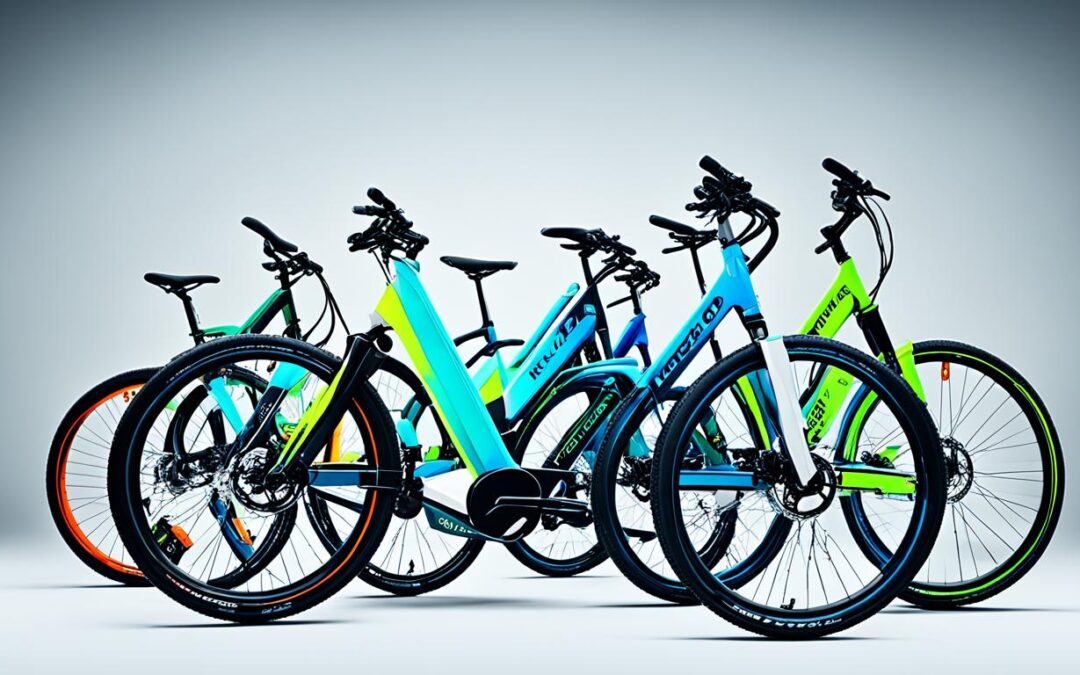Owning an electric bicycle is a fantastic way to embrace eco-friendly transportation while enjoying the many benefits of biking. However, it’s important to understand the cost implications before making a purchase. Electric bikes, commonly known as e-bikes, come in a wide range of prices, depending on factors such as the type of bike, features, and brand.
E-bike pricing can vary greatly, with the average price ranging from $600 to $2,500. Of course, there are high-end models that can go up to $8,000 or more. The specific type of e-bike will also influence the cost. For example, mountain e-bikes can range from $1,000 to $15,000, while road e-bikes typically fall between $1,000 and $6,000. Cruiser e-bikes generally cost between $700 and $3,000, while electric trikes can be found in the range of $1,000 to $5,000. When determining the price, it’s crucial to consider the quality, specifications, and design of the e-bike.
Key Takeaways:
- Electric bikes vary in price, with an average range of $600 to $2,500.
- The type of e-bike, such as mountain, road, cruiser, or electric trike, affects the price range.
- High-end models can reach prices as high as $8,000.
- Consider the quality, specifications, and design when evaluating the price of an electric bike.
- Mountain e-bikes can range from $1,000 to $15,000, while electric trikes generally cost between $1,000 and $5,000.
The Financial Benefits of E-Bikes
Electric bikes not only provide an eco-friendly and healthy mode of transportation but also offer significant financial benefits. Compared to owning a car, purchasing an e-bike is much more affordable, with basic commuter e-bikes ranging from $1,000 to $4,000. Recharging an e-bike costs significantly less than fueling a car, with estimated daily savings of $1.92 when biking instead of driving. Maintenance costs for e-bikes are also lower, averaging around $754 per year compared to approximately $1,186 for a car. Additionally, e-bikes eliminate the need for costly expenses like parking fees, insurance, licenses, taxes, and car payments. By choosing an e-bike, you can save money while enjoying the benefits of biking.
Not only are e-bikes more affordable than cars, but they also offer a budget-friendly alternative to traditional bikes. With rising fuel prices and increased car maintenance costs, opting for an e-bike can be a wise financial decision. In fact, owning an e-bike can significantly reduce your daily transportation expenses, helping you save money in the long run.
Compared to buying a new car, investing in an e-bike is a more budget-friendly option. With prices starting as low as $1,000, you can experience the convenience and benefits of an electric bike without breaking the bank. Plus, with the lower maintenance costs and savings on fuel, insurance, and parking fees, owning an e-bike becomes even more cost-effective.
Aside from being a wallet-friendly choice, e-bikes also provide valuable health benefits. By incorporating exercise into your daily routine, you can improve your fitness levels and overall well-being. This, in turn, can lead to fewer medical expenses and a healthier lifestyle.
Committed to making transportation accessible to all, many e-bike brands offer a variety of affordable options. These budget-friendly e-bikes provide an excellent entry point for individuals interested in reducing their carbon footprint and embracing a more sustainable form of transportation.
Choosing an Affordable E-Bike
When considering budget-friendly e-bikes, it’s important to keep your needs and preferences in mind. Determine what type of e-bike suits your lifestyle – whether you need a commuter bike, a mountain bike, a cruiser, or another style. Research different brands and models to find an electric bike that offers the features you desire at a price that fits within your budget.
If you’re uncertain about making a large upfront investment, some e-bike brands offer financing options, allowing you to pay for your e-bike over time. This can help make your dream of owning an electric bike a reality without putting a strain on your finances.
Overall, budget-friendly e-bikes offer not only an affordable means of transportation but also a way to experience the joy and benefits of biking without the high costs associated with car ownership. Whether you’re looking for a budget-friendly commuter e-bike or a more specialized model, there are numerous options available to suit your needs and budget.
Factors Affecting E-Bike Costs
Several factors contribute to the overall cost of an electric bike. Here are some key considerations:
Brand and Model
The brand and specific model of the e-bike play a significant role in determining the price. High-end electric bikes from reputable brands, such as Trek or Specialized, with advanced features and cutting-edge technology, can cost up to $10,000. On the other hand, more budget-friendly options from brands like Ancheer or Schwinn can be found for as low as $300.
Type of Bike
The type of e-bike you choose will also impact the cost. Lightweight commuter e-bikes designed for urban environments tend to be more affordable, ranging from $600 to $2,000. On the other hand, high-powered e-mountain bikes equipped with high-performance motors and robust suspensions can range from $2,000 to $8,000 or more.
Financing Options
For those who may not be able to afford the upfront cost of an electric bike, there are financing options available through selected employers or e-bike brands themselves. These options make purchasing an e-bike more accessible by allowing you to pay for it in installments over a set period.
To help you understand the cost comparison of different e-bikes, here’s a table highlighting different price ranges based on the brand, model, and type of bike:
| Brand | Model | Type | Price Range |
|---|---|---|---|
| Trek | Powerfly | Mountain | $3,000 – $8,000 |
| Specialized | Como | Commuter | $2,500 – $5,000 |
| Ancheer | Electric Bike | Commute/Light Trail | $300 – $800 |
Remember to consider your specific needs and budget when comparing e-bike costs. By understanding the different factors that affect e-bike prices, you can make an informed decision and find an electric bike that meets both your financial and riding requirements.
Additional Costs of Owning an E-Bike
Alongside the initial purchase price, owning an electric bike entails additional costs that should be taken into account. Maintenance expenses, such as brake adjustments, tire repairs, and regular tune-ups, typically range from $20 to $100 depending on the service needed.
Battery replacement is another cost to consider, as e-bike batteries typically need to be replaced every 2-5 years. The price of a new battery can range from $350 to $800, depending on the brand and model of the electric bike.
Charging costs should also be factored into the overall budget. On average, the cost of charging an electric bike ranges from $1.28 to $4.28 per 1,000 miles. The exact cost will depend on the electricity rates in your area and the capacity of your bike’s battery.
To ensure uninterrupted rides, it is recommended to invest in a spare battery charger and potentially even a second battery, especially for longer rides where recharging may not be readily available.
Protective gear is essential for safe e-bike riding and should also be considered in the overall cost. Items such as helmets, mirrors, lights, and bike locks add an additional expense but are vital for personal safety and theft prevention.
Adding up these additional costs is crucial to get a comprehensive understanding of the overall expenses associated with owning an e-bike. By factoring in maintenance, battery replacement, charging costs, and protective gear, you can make a more informed decision when comparing and budgeting for different electric bike models.
Now, let’s take a look at the overall cost of owning an e-bike and summarize the key considerations discussed in this article.
Conclusion
When it comes to the cost of electric bikes, there are a few key factors to consider. The price range can vary significantly, with e-bikes ranging from $600 to $8,000 or more. The specific cost will depend on the type of bike, features, and brand you choose. However, it’s important to remember the financial benefits that e-bikes offer.
Compared to owning a car, e-bikes can provide significant savings. Not only are they more affordable to purchase, but recharging and maintenance costs are also considerably lower. Additionally, expenses like parking fees, insurance, and taxes can be completely eliminated. By investing in an e-bike, you can save money and enjoy a healthier lifestyle.
With the average American spending a significant amount on medical bills, therapy sessions, and wasted commuting time, owning an e-bike can make a real difference. It not only saves you money but also allows you to stay active and reduce your carbon footprint. Take the time to explore the price range of e-bikes, consider your budget and needs, and start enjoying the many benefits of owning an e-bike.
FAQ
How expensive are electric bikes?
The price of electric bikes can range from 0 to ,000 or more, depending on the brand, model, and features.
Are there affordable options for e-bikes?
Yes, there are budget-friendly e-bikes available, with prices starting as low as 0.
How do electric bike prices compare to traditional bikes?
Electric bikes generally require a bigger initial investment compared to traditional bikes due to the added cost of the motor and battery. However, they offer significant financial benefits in terms of savings on fuel, maintenance, and other expenses when compared to owning a car.
What factors affect the cost of an electric bike?
The cost of an electric bike is influenced by factors such as the brand, model, type of bike (e.g., commuter, mountain, road), and specific features like motor size and battery capacity.
What are the additional costs of owning an e-bike?
Additional costs of owning an electric bike include maintenance expenses like brake adjustments and tune-ups, battery replacement every 2-5 years, charging costs, and the purchase of protective gear.

